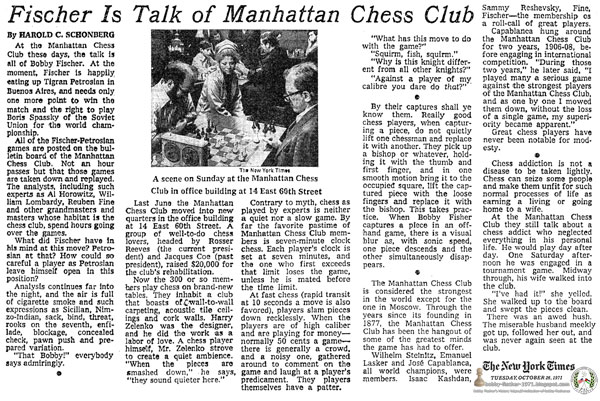New York Times, New York, New York, Tuesday, October 26, 1971 - Page 32
Fischer Is Talk of Manhattan Chess Club By Harold C. Schonberg
At the Manhattan Chess Club these days, the talk is all of Bobby Fischer. At the moment, Fischer is happily beating up Tigran Petrosian in Buenos Aires, and needs only one more point to win the match and the right to play Boris Spassky of the Soviet Union for the world championship.
All of the Fischer-Petrosian games are posted on the bulletin board of the Manhattan Chess Club. Not an hour passes but that those games are taken down and replayed. The analysis, including such experts as Al Horowitz, William Lombardy, Reuben Fine and other grandmasters and masters whose habitat is the chess club spend hours going over the games.
What did Fischer have in his mind at this move? Petrosian at that? How could so careful a player as Petrosian leave himself open in this position?
Analysis continues far into the night, and the air is full of cigarette smoke and such expressions as Sicilian, Nimzo-Indian, sack, bind, threat, rooks on the seventh, enfilade, blockage, concealed check, pawn push and prepared variation.
“That Bobby!” everybody says admiringly.
[…]
By their captures shall ye know them. Really good chess players, when capturing a piece, do not quietly lift one chessman and replace it with another. They pick up a bishop or whatever, holding it with the thumb and first finger, and in one smooth motion bring it to the occupied square, lift the captured piece with the loose fingers and replace it with the bishop. This takes practice. When Bobby Fischer captures a piece in an off-hand game, there is a visual blur as, with sonic speed, one piece descends and the other simultaneously disappears.
The Manhattan Chess Club is considered the strongest in the world except for the one in Moscow. Through the years since its founding in 1877, the Manhattan Chess Club has been the hangout of some of the greatest minds the game has had to offer.
Wilhelm Steinitz, Emanuel Lasker and Jose Capablanca, all world champions, were members. Isaac Kashdan, Sammy Reshevsky, Fine, Fischer—the members as a roll-call of great players.
Capablanca hung around the Manhattan Chess Club for two years, 1906-08, before engaging in international competition. “During those two years,” he later said, “I played many a serious game against the strongest players of the Manhattan Chess Club, and as one by one I mowed them down, without the loss of a single game, my superiority became apparent.”
Great chess players have never been notable for modesty. …
























